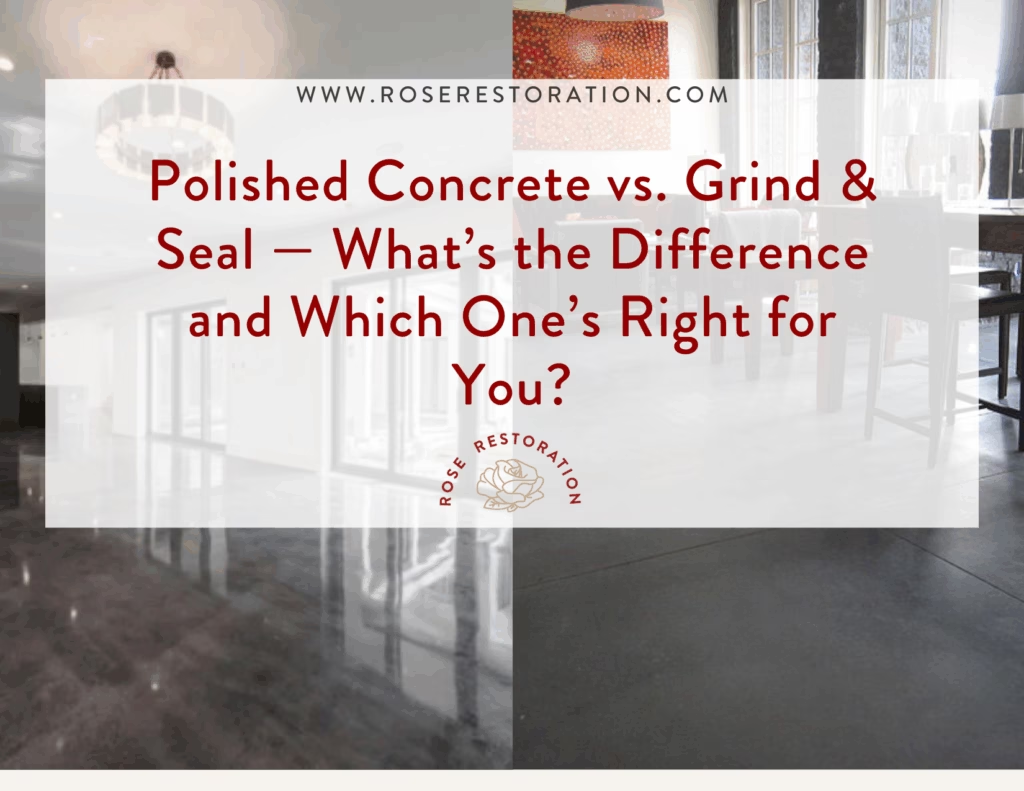Concrete floors have come a long way from their industrial beginnings. Today, polished concrete flooring and grind-and-seal finishes are among the top choices for homeowners, architects, and facility managers who want durability, style, and long-term value.
At Rose Restoration, we help clients transform dull or damaged slabs into high-performance concrete floors that are both beautiful and functional. Understanding the difference between these two systems ensures your investment delivers lasting results.
What Is Polished Concrete?
Polished concrete floors are created through a multi-step mechanical process that uses progressively finer diamond abrasives to refine and strengthen the surface. The result is a smooth, reflective, stone-like floor that’s easy to maintain and built to last.
Process Overview
Grinding: Removes imperfections and exposes the desired level of aggregate.
Honing: Refines the surface and tightens pores.
Polishing: High-grit diamonds (up to 3000) achieve a satin or high-gloss finish.
Densifying: A lithium concrete hardener increases density and surface strength.
Sealing (optional): A breathable concrete sealer enhances clarity and protection.
Benefits
Ultra-durable, sustainable flooring option
Resistant to foot traffic and abrasion
Ideal for industrial concrete floors, retail showrooms, and modern homes
Low maintenance — just dust-mop and damp-clean
What Is Grind & Seal?
Grind-and-seal concrete flooring provides a similar aesthetic at a lower cost. Instead of polishing the slab itself, the surface is ground smooth and sealed with a topical coating such as epoxy, polyurethane, or acrylic.
Benefits
Excellent for decorative concrete floors and garage applications
Affordable, quick-turnaround option
Customizable with concrete dyes, tints, or stain-resistant coatings
Perfect for basements, warehouses, and light-commercial projects
Maintenance Consideration
Because grind-and-seal systems depend on a topical layer, they need periodic re-sealing — usually every 3–5 years for residential spaces or annually in heavy-use commercial environments.
Polished Concrete vs. Grind & Seal Comparison
| Feature | Polished Concrete | Grind & Seal |
|---|---|---|
| Durability | Long-term, permanent finish | Moderate lifespan, reseal required |
| Maintenance | Minimal | Periodic resealing |
| Cost | Higher upfront | Budget-friendly |
| Finish | Natural, stone-like gloss | Coated, film-finish look |
| Ideal Use | Commercial lobbies, restaurants, high-traffic areas | Garages, warehouses, utility rooms |
Why Choose Rose Restoration
We specialize in commercial concrete polishing, residential floor restoration, and decorative concrete resurfacing throughout the DC, Maryland, and Virginia region.
Our technicians use industrial-grade concrete grinders, densifiers, and sealers to achieve flawless, long-lasting finishes tailored to each client’s goals.
Whether you’re upgrading a home interior or managing a full-scale commercial concrete restoration project, Rose Restoration delivers craftsmanship that stands the test of time.

